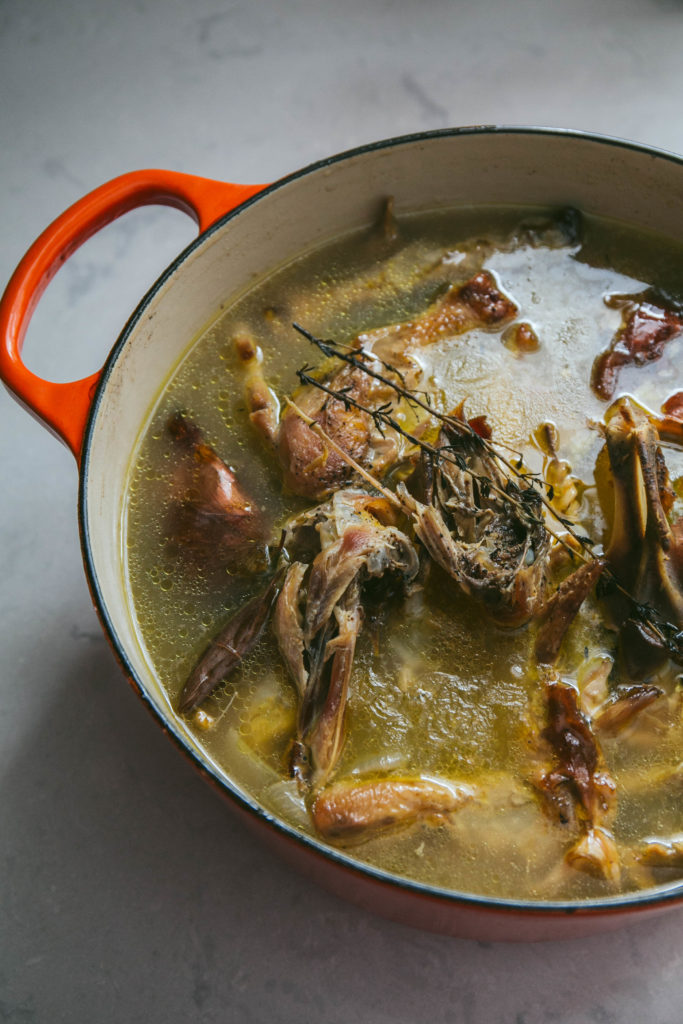Can chicken bone broth be Safe for Infants? Here’s What You Need to Know
Can chicken bone broth be Safe for Infants? Here’s What You Need to Know
Blog Article
The Importance of Healthy Food: Why Bone Broth Is a Fantastic Option for Babies
Bone broth stands out as a nutrient-dense choice, providing important vitamins and minerals that sustain development and growth. What are the finest methods to introduce bone broth to your little one?
Nutritional Conveniences of Bone Broth for Infants
When you introduce bone broth to your baby's diet plan, you're providing a nutrient-dense food that uses countless health and wellness benefits. Loaded with necessary nutrients, bone broth contains calcium, magnesium, and phosphorus, which support your infant's growing bones. It's also abundant in collagen, aiding in the advancement of healthy skin, joints, and connective cells.
In addition, bone broth is an outstanding source of amino acids like glycine and proline, which play a significant duty in overall growth and muscular tissue development. These nutrients assist advertise a strong immune system, setting a strong foundation for your infant's health.
In addition, bone broth is simple to digest, making it a gentle alternative for your youngster. By incorporating this wholesome food right into their meals, you're guaranteeing they get essential nutrients essential for their general wellness. Go ahead and make bone broth a staple in your baby's diet!
Exactly How Bone Broth Sustains Digestion
Bone broth is loaded with necessary nutrients that can truly benefit your infant's digestion. It promotes gut health and aids with nutrient absorption, making it a terrific enhancement to their diet. By incorporating bone broth, you're setting the stage for a much healthier digestive system.
Nutrient-Rich Make-up
One of the most nutrient-rich foods you can present to your baby's diet plan is bone broth, which is loaded with necessary minerals and amino acids that support healthy digestion. Rich in collagen, bone broth assists strengthen your baby's gut cellular lining, making it easier for their body to absorb nutrients. By incorporating bone broth right into your infant's dishes, you're offering them a wholesome food that nurtures their digestive system effectively.
Promotes Intestine Wellness
As you introduce bone broth right into your infant's diet, you'll find it not just nourishes but additionally advertises digestive tract health successfully. Rich in jelly, bone broth helps relieve the digestive system system, lowering inflammation and supporting a healthy digestive tract cellular lining. Additionally, the amino acids located in bone broth, such as glycine, aid in food digestion and can aid avoid usual tummy difficulties.
Aids Nutrient Absorption
Presenting bone broth not just supports gut health yet also plays a considerable function in aiding nutrient absorption. When you offer your infant bone broth, you're giving a rich source of minerals and amino acids that boost their digestive system processes. The gelatin in bone broth aids to soothe the intestine cellular lining, enhancing its capacity to soak up crucial nutrients. This indicates that critical minerals and vitamins from other foods are more efficiently made use of by your baby's growing body. Additionally, bone broth consists of collagen, which supports the growth of healthy tissues and body organs. By including this nutrient-dense liquid right into your baby's diet plan, you're guaranteeing they get the optimum take advantage of their meals, promoting general wellness and well-being.
Enhancing the Body Immune System With Bone Broth

By integrating bone broth right into your infant's diet, you're offering a natural source of nutrients that promotes health. Take into consideration making bone broth a staple in your infant's meals, as it can play a vital role in their immune health and growth.
Easy Ways to Integrate Bone Broth Into Child's Diet
Including bone broth right into your infant's diet regimen can be straightforward and rewarding. You can additionally use bone broth as a base for soups or stews that you prepare for the family, ensuring your baby obtains a taste of scrumptious, healthy dishes.
If your child appreciates grains, take into consideration cooking rice or quinoa in bone broth rather of water for additional nourishment. These techniques will certainly help your infant gain the advantages of bone broth easily!
Homemade vs. Store-Bought Bone Broth: What to Select
Which is better for your infant: homemade or store-bought bone broth? Homemade bone broth provides you complete control over the components. You can choose top quality bones, organic veggies, and herbs, guaranteeing your baby gets one of the most nutrients without ingredients or chemicals. Plus, making it in the house can be a rewarding experience, allowing you to bond with your child while preparing wholesome food.
On the various other hand, store-bought choices are convenient and conserve you time. They usually contain preservatives and may not match the depth of flavor and nutrition you obtain from homemade broth. If you select store-bought, seek brands that are natural and devoid of ingredients.
Ultimately, if you have the moment and resources, homemade bone broth is the remarkable selection for your infant's health and wellness. If you're short on schedule, pick a high quality store-bought choice as a back-up.
Age-Appropriate Bone Broth Serving Ideas
As your child grows, it is essential to customize bone broth page offering ideas to their developmental stage. For babies around six months, begin with a few does of diluted bone broth. Mix this page it with water or breast milk to make it simpler for them to digest. As they end up being familiar with flavors, you can slowly present thicker broth by minimizing the dilution.
By the time your little one is around a year old, take into consideration supplying bone broth as a standalone beverage or mixing it right into soups and stews. Just make sure to maintain the broth low in sodium.
Other Healthy Foods to Couple With Bone Broth for Infants
When you're wanting to enhance the dietary worth of bone broth for your baby, consider pairing it with nutrient-dense vegetables like carrots and spinach. Whole grain choices, such as quinoa or wild rice, can additionally include appearance and fiber. Additionally, including healthy protein sources like shredded chicken or lentils will certainly round out the dish perfectly.

Nutrient-Dense Vegetables
Nutrient-dense vegetables are a superb addition to bone broth for babies, improving both flavor and nourishment. Integrating veggies like carrots, spinach, and pleasant potatoes can improve the minerals and vitamin content of your broth. Carrots provide beta-carotene for healthy and balanced vision, while spinach is packed with iron and calcium, important for growth. Sweet potatoes include natural sweetness and are rich in fiber, helping digestion.
You can conveniently blend these vegetables into the broth or offer them as soft, cooked items together with it. This not just presents brand-new tastes but additionally encourages your kid to take pleasure in a variety of nutrients. By matching nutrient-dense veggies with bone broth, you're laying the foundation for a healthy and balanced diet regimen right from the begin.
Whole Grain Options
:max_bytes(150000):strip_icc()/275984-chicken-bone-broth-DDMFS-KH-4x3-e86adbd246dc4180a9c62fdb349249f3.jpg)
Healthy Protein Sources
Bone broth sets splendidly with numerous healthy and balanced protein sources, better enhancing your baby's diet plan. Try adding soft, prepared lentils; they're nutrient-dense and jam-packed with healthy protein. You can likewise blend in shredded chicken or turkey, which are simple for your little one to digest. If you're trying to find plant-based choices, think about mashed tofu or pureed chickpeas-- both offer outstanding protein without frustrating flavors. Eggs, when presented securely, are one more terrific option; they're flexible and loaded with nutrients. Eventually, assimilating some well-cooked quinoa can add a great structure and added healthy protein. By incorporating these healthy protein sources with bone broth, you're offering your baby a balanced, nourishing dish that supports their development and advancement.
Often Asked Questions
Can Bone Broth Reason Allergic Reactions in Infants?
Yes, bone broth can trigger allergies in infants, specifically if they're delicate to particular components. Always consult your pediatrician prior to presenting brand-new foods and screen for any indicators of allergic reactions after feeding.
How Should Bone Broth Be Kept for Infants?
You ought to save bone broth in impermeable containers, either in the refrigerator for up to a week or in the freezer for up to 3 months. chicken bone broth. Always thaw it correctly prior to offering to your infant
Is It Safe to Offer Bone Broth to Premature Babies?
It's vital to consult your pediatrician before introducing bone broth to early infants. They'll analyze your child's specific health needs and ensure it's risk-free, considering their distinct dietary demands and developmental phase. Constantly focus on experienced advice.
What Are the Indications of Intolerance to Bone Broth in Infants?
When presenting bone broth, look for indicators like fussiness, breakout, diarrhea, or vomiting. If your baby reveals any of these reactions, it's ideal to consult a pediatrician prior to continuing to use it.
Can Bone Broth Be Utilized as a Dish Replacement for Infants?
No, you should not use bone broth as a meal replacement for babies. It does not have important nutrients required for their development. Instead, integrate it right into their diet regimen together with well balanced meals for included sustenance and taste.
Report this page